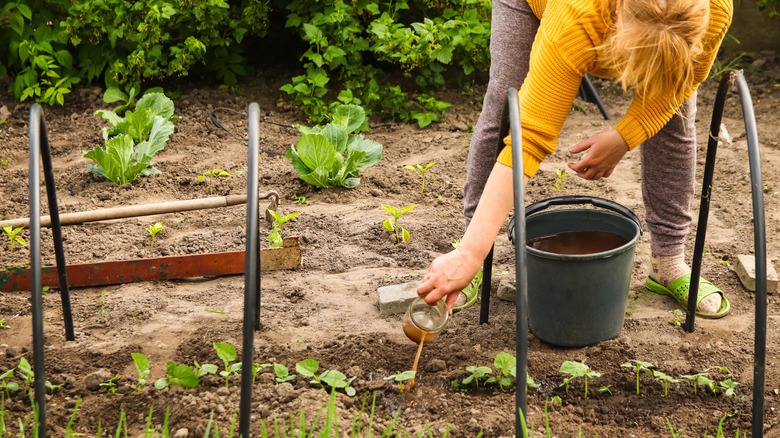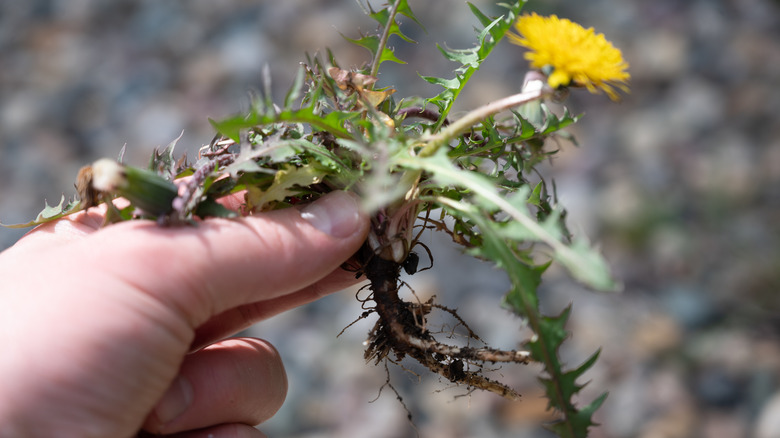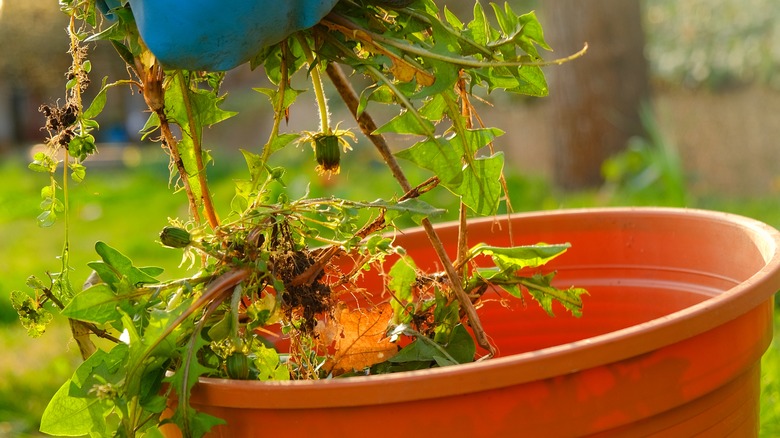The Annoying Weed That Acts As Perfect Fertilizer For Your Garden
You're constantly pondering how to get rid of dandelions in your lawn and garden beds. Their deep roots embed so far into the ground that they're a literal pain to dig out. Rather than curse their very existence or dump their hacked remains onto your compost pile, where they're liable to spread, why not turn them into a healthy beverage for your plants? Compost tea, weed tea, fertilizer tea ... whatever you prefer to call it, is made of dandelions soaked in a bucket of water until they turn into a slurry. It might not seem tasty to humans, but flora feast on the nutrients — everything from essentials like potassium to micronutrients like zinc — released into the liquid as the dandelion plant breaks down.
Around 100 species of Taraxacum officinale, better known as dandelion, are found worldwide. They share characteristics familiar to almost everyone, gardener or not: a sunshine yellow, long-lived inflorescence (group of flowers), a fluffy round seedhead boasting a cluster of white parachute-like seeds, and long, thin, toothed green leaves extending out from a central crown. Dandelions hug the ground as they grow, anchored into the soil by a tap root that grows as long as 15 feet. Making weed tea from dandelions is easy and brings clear benefits to your garden, including providing a fast-acting, organic food source that can be applied often with few adverse side effects and improving, in particular, fruit quality.
What's in it?
A surprise benefit of having some dandelions in your lawn is that they're nitrogen-fixing, notes Nikki Seelbach of Charlie and Sons Landscapes (via The East Hampton Star). The plant not only contains the N and the K of the N-P-K (nitrogen, phosphorous, and potassium) nutrient trio essential to commercial fertilizers, but it's also chock-full of other elements helpful for healthy vegetation: Vitamins A, C, B, D, and B12; sodium; calcium; iron; magnesium; and growth regulating antioxidants like tocopherols, thiamine, riboflavin, and niacin. Fermented and dried dandelion is used in biodynamic farming to improve compost, enhancing the action of silica in the soil.
The credit for all this goodness must be given to the dandelion's aforementioned immense tap roots. They dive deep into the soil, extracting trapped nutrients for the plant's stems, leaves, and flowers. In fact, iron-based herbicides exploit this ability; the dandelion absorbs so much iron that necrosis, or tissue death, occurs, killing the plant. As the dandelions you plucked from your lawn and added to that bucket of water decompose, nutrients are released from all parts of the plant into the resulting tea, making them available to anything you feed it to. That's not always a good thing, though. Depending on where the plant grows, it could extract dangerous elements and heavy metals — arsenic, lead, cadmium, and chromium, among many others. A 2023 study published in PLOS ONE also found an alarmingly high incidence of potentially health-harming pathogens on the plants.
Get brewing
You can use all parts of the dandelion for fertilizer tea. To avoid contamination of said tea, harvest dandelions in areas where little to no pesticides, herbicides, or chemical additives have been used. Avoid roadsides (exposure to vehicle emissions) and sites formerly or now zoned for heavy industry. Like all plants, dandelions are at their most nutritious just before they flower, so go weed hunting in early spring — or even late winter in warmer areas since the iconic yellow blooms appear before almost any other spring flower. Choose healthy plants; look for lush leaf growth with no apparent blemishes, signs of nutrient deficiencies, or insect infestations.
To brew this verdant liquid fertilizer, you'll need a plastic bucket (metal may rust), shears, breathable cloth, garden twine, and a stirring stick. A large mesh bag, like an old laundry bag, is optional. Chop your gathered dandelions into small pieces, letting them drop directly into the bucket or the mesh bag. Aim for about 2 pounds of dandelion to 2.5 gallons of water. Fill the bucket a few inches from the rim with water — tap water from the garden hose is fine. Stir the mixture to ensure all the pieces of dandelion are underwater. Secure the cloth atop the bucket with twine and leave it somewhere safe from the elements. The tea is ready to use after one to four weeks. Dilute it at a 1:4 ratio with water and use it as a soil fertilizer or foliar spray.


